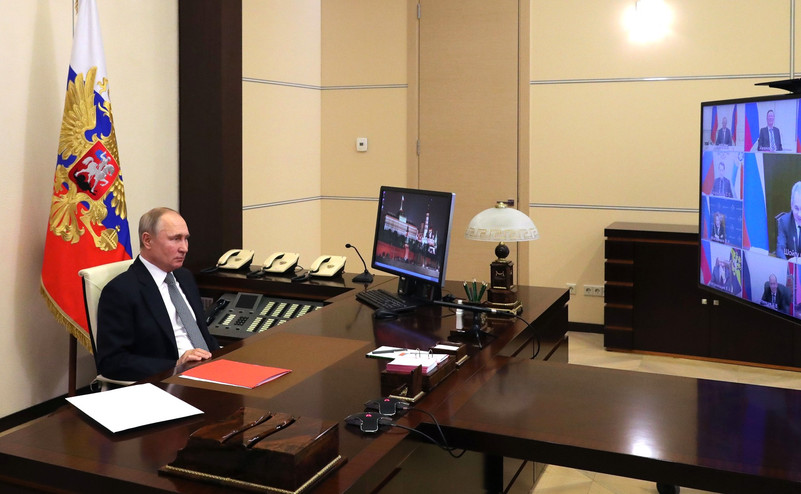Three options for West on Putin's Ukraine build-up
As Russian troops gather near Ukraine's eastern border, the international community has pondered an important question. Will Russia launch a new offensive into Ukraine?
According to some policy analysts and experts, Russia is trying to provoke a response from the new US administration while attempting to unsettle Ukraine.
Russia has already endured heavy losses from the ongoing Donbas conflict, where 14,000 Ukrainian and Russian soldiers and civilians have perished.
The illegal annexation of Crimea has also not gone according to plan.
Over the past seven years, Russia has spent billions on trying to integrate the peninsula.
Simply put, the costs of launching a new offensive into the Donbas would be too expensive for Russian president Vladimir Putin and his men. The loss of life would also be grave.
Other scholars and specialists, however, have argued that a new Russian incursion is possible. Following the collapse of the Soviet Union, Russia has continuously tried to keep its neighbours within its sphere of influence.
The West has witnessed this on at least two occasions.
First, in 2008, Russia launched a war against Georgia during the Beijing summer Olympics. Then,
in 2014, Russia illegally annexed Crimea and invaded Ukraine's Donbas region following the conclusion of the Sochi winter Olympics.
In both instances, few predicted that Russia would attack its neighbours, yet this still occurred. Due to an ill-prepared West, the results of these Russian military incursions have been devastating for Georgia and Ukraine.
According to experts, the restoration efforts of Georgia's and Ukraine's conflict regions are estimated to cost €3bn and €10bn, respectively. The loss of life was also tremendous.
Given the uncertainty with what lies ahead, Western politicians and policymakers must be prepared to act. There are three possibilities on how they can respond to Russia's recent military buildup near Ukraine.
Three choices
First, the Nato could conduct joint military exercises with Ukrainian forces near Ukraine's western border. The West could also station naval vessels on the Black Sea. These actions would demonstrate that the West is committed to defending Ukraine's sovereignty and territorial integrity.
Neither the West nor Russia is willing to start a world war over Ukraine, meaning that a hard power response would show Russia that the West is serious. This would likely de-escalate tensions near the Russo-Ukrainian border.
A second and less forceful alternative would see the West implement new sanctions on the Russian Federation.
The United States recently imposed sanctions on Russia for the poisoning of Alexei Navalny, but Russia has gone unpunished for its meddling in the 2020 US presidential election and its recent cyberattacks.
Should the US and the European Union impose new and greater sanctions, they should target Russian business owners and politicians close to Putin. Implementing these severe sanctions would further weaken the Russian economy, and this would likely see the Russians back down.
Finally, a third option that the West should pursue is their continued dialogue with Ukrainian leaders.
Over the past few weeks, American and European representatives held phone calls with Ukrainian officials. During these discussions, the Western leaders reaffirmed their commitment to Ukraine.
Nato secretary general Jens Stoltenberg and Ukrainian foreign minister Dmytro Kuleba also met to discuss the recent tensions near the Russo-Ukrainian border.
These interactions demonstrate that the West is serious about its relationship with Ukraine, and that it will support the Eastern European state during its time of need.
Western politicians should also work with their Russian counterparts to try and dissolve the situation. Maintaining an open course of dialogue would show that the West and Russia are willing to cooperate on this important issue.
Putin's puzzling enigma
Overall, many Western politicians, civil servants, and policymakers are puzzled by Putin's intentions as Russia reinforces its military presence near Ukraine's eastern border.
Some have argued that Russia is trying to provoke a response from the West. Others claim that the Russians are preparing for another attack.
Given this uncertainty, nothing should be ruled out of the realm of possibility, and the West should be prepared to respond.
A new Russian incursion into Ukraine would upend the European continent's security apparatus, and Western leaders must be ready for this potential scenario. Otherwise, if they are not prepared, the aftermath of these events will be catastrophic for Europe and the globe.
AUTHOR BIO
Mark Temnycky is a freelance journalist covering Eastern Europe and its impact on US and European foreign policy and national security. His articles have been published by the Atlantic Council, the Wilson Center, the Center for European Policy Analysis, Forbes, and the Diplomatic Courier.

No comments:
Post a Comment